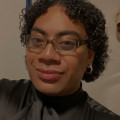Emerging Scholar Awards



Dalhousie University, Canada
Emma Bugg (she/her) is an Interdisciplinary PhD candidate at Dalhousie University in Halifax, Canada. Emma’s thesis explores how the burgeoning field of Sustainability and the Arts (SATA) can be more clearly conceptualized and structurally supported to strengthen its scholarly coherence and transformative potential. Emma sits on the Research Working Group for Mass Culture, a Canadian arts research organization, as serves as Co-Lead of the Environmental Resilience Research Cluster of The Arts Impact Partnership. Emma also works as the coordinator of the Sustainable Nunatsiavut Futures Art Collective, a collective of artists enhancing research activities through Inuit-led artmaking, and as a Research Associate on Ărramăt, a research project supporting Indigenous health and wellbeing through Indigenous knowledges of environmental stewardship.

Independent Artist, United Kingdom
Ekaterina (Eka) Zharinova is a dancer, performance maker, and researcher based in the UK. She danced and toured globally with Provincial Dances Theatre under choreographer Tatiana Baganova in the 2000s. Eka has danced in productions choreographed by Maida Withers, Alexander Pepelyaev, Kota Yamazaki, and Anouk van Dijk. She has been making performances independently and collaboratively for 20 years. She has a Ph.D. in Performance Studies from the University of California, Davis, and her work is centred around dance performance as research. Her major interests lie at the intersections of dance and technology, dance and mathematics, and dance and society.

University of Edinburgh/Kaohsiung American School, Taiwan
Evan Wichman is a dedicated secondary music educator and choral conductor whose international career spans the American School of Brasilia (Brazil) and Beijing National Day School (China), following earlier work with the New York City Department of Education at Maspeth High School. He currently teaches at Kaohsiung American School in Taiwan. Holding a B.Mus. in Music Education (Summa Cum Laude) from Syracuse University, an M.Mus. in Choral Conducting from Emory University, and an M.Sc. in Education Futures from the University of Edinburgh, he was a Fulbright-Hays Summer Seminar participant in Ecuador (2018) and an Academy for Teachers Fellow (2019). His research explores relaxed performances as inclusive, neurodiversity-affirming educational experiences.

Whitecliffe College of Art and Design, New Zealand
George Funaki is a leitī, artist, independent curator and researcher currently based in Tāmaki Makaurau. His journey began within the fashion industry where he worked as an emerging and independent fashion designer, stylist and freelance project manager. However, his practice shifted once he identified issues of representation pertaining to queer-Pacific identities, specifically leitī, with an emphasis on New Zealand-born Pacific people. Funaki now works as an interdisciplinary practitioner whose practice spans across moving-image, performance, installation and writing to explore relationality. Within Funaki’s practice, they play a dual role–both symbolically and literally–as the subject and maker of their art, investigating how leitī phenomenology examines the mundane as a site of meaning-making. Funaki does this by referencing Pacific, feminist and queer theory, to look at how culture, body, and belonging can intersect and resist Western value systems through a leitī worldview.

Universidade de Coimbra, Portugal
Patrícia Martins is a doctoral candidate in Artistic Studies at the Faculty of Arts and Humanities of the University of Coimbra, funded by a research fellowship from the Foundation for Science and Technology (FCT). She holds a BA in Cultural Animation and an MA in Cultural Management from ESAD.CR, where she explored how artistic and cultural dynamics shape territorial development and collective agency.
Her research focuses on cultural-artistic mediation, civic participation, and the role of the arts in lifelong learning, in fostering relationships between people and territories, and in promoting intercultural dialogue and respect for diversity. She examines how artistic practices create spaces for encounter, dialogue, shared authorship, and relational knowledge, strengthening democratic and inclusive cultural experiences in schools and communities.

University of Dhaka, Bangladesh
Soniya Akter is a student of Islamic History and Culture at the University of Dhaka, Bangladesh and Vice President of the Dhaka University Dot Initiative Youth Club. She is actively engaged in youth leadership, sustainable development, climate advocacy, and heritage site preservation. Soniya has participated in workshops on climate, environment, and water issues, including the Asian Environment Youth Network and International Youth Conference, and has received research training from CARRAS Dhaka University Research Society . She contributes to iNaturalist, participates in Dhaka University Quiz and English Debate Societies, serves as a Scout Volunteer, works with and Socchar Student’s Network, and has received essay, quiz, and scholarship awards. She also serves as Content Writer at Dot Initiative, Department Executive Officer at National Brighten Association, English Script Evaluator at Udvash Coaching Center, and Campus Ambassador for Buniad. She is conducting research on Royalbari Fort, presenting at its conference on 22 January 2026, and serves as Outreach and Membership Coordinator for the Thousand Scholars Initiative.

Manav Rachna University, India
Abhishek is an educator, researcher, and theatre practitioner based in Delhi, and leads the education programmes at Humana People to People India. He has experience in content development, training, theatre performance, research, and programme management in India and the UK. He has facilitated activities with students, educators, and artists. He has authored works on education and arts. He has received the Ford Foundation Fellowship, AFG Fellowship, IFPA Award, Tagore National Scholarship, and Senior Fellowship. He has presented his work at notable conferences, including the ‘Reimagining Teachers and Teacher Education for Our Futures Conference’ at the University of Helsinki, Finland.

St. Thomas University, United States of America
Zartasha Shah is a doctoral candidate in the Ed.D. program at St. Thomas University in Miami, Florida. She is a recipient of the President’s Volunteer Service Award from the White House and has also been honored by the Consul General of Pakistan in Houston. A published author and international presenter, she has shared her research in multiple countries. Residing in Texas, USA, Shah’s work emphasizes the role of solid, logical, and empirical evidence in shaping educational understanding. Her research explores how the emergence of knowledge can foster accountability, responsibility, and critical reflection to decolonize instructional practices and enhance learning strategies.

Nagaon University, India
Dr. Rashmita Phukan has been working as an Assistant Professor in the Department of History, Nagaon University since 17th November 2020. Prior to this, she had served as Assistant Professor (Contractual) in the Department of History, Cotton University, Guwahati, Assam for a period of four years and also taught in the Post Graduate Department of Ancient Indian History, Culture and Archaeology of Cotton University for two semesters. She had also worked as a Guest Faculty in the Department of History, Gauhati University for two semesters teaching papers on Social History of Ancient India, History of Ancient Assam. She obtained her Ph.D degree in 2024 from Gauhati University on the topic ‘Vaishnavism in Assam with Special Reference to Sculptures (Up to 14th Century CE)’ under the supervision of Prof. Paromita Das, Former Head, Department of History, Gauhati University. She was awarded her M.Phil in 2018 on the topic ‘Ambari Sculptures: A Study on their Style and Socio-Economic Aspects’. Her areas of interest include Early Indian Art, Iconography, Society and its Reflection in Art, Forms of art traditions in Early Assam, etc. She has published papers in peer-reviewed and Scopus indexed journals on various aspects of art and culture pertaining to early Assam. She has presented papers in several national and international conferences and is a Life Member of the Indian Art History Congress, a national forum on Art and Aesthetics of India.

Philippine Women's University, Philippines
Dr. Daniel D. Dasig Jr. is a Professional Computer Engineer, currently serves as the Research Director and Quality Assurance Coordinator of Philippine Women’s University, and the Alumni Regent of Samar State University’s Board of Regents. He is also the President of the Federation of SSU Alumni Associations, and the DEFAS Society of Engineers Inc. He holds doctoral degrees in engineering, business administration, and educational management, and currently pursuing a doctorate in public administration, complemented by his more than 17 years of extensive professional experience in engineering and IT/telco project and change management in both the Philippines and Canada. A seasoned academic leader, Dr. Dasig is also Editor-in-Chief of three international journals, and an editorial board member and reviewer for Scopus- and Web of Science-indexed publications where he actively advances global scholarship in technology, sustainability, and higher education leadership. His work bridges industry practice, research excellence, and institutional quality assurance within local and international academic communities.
I’m so grateful to have been selected as one of the online Emerging Scholars, which gave me the opportunity to participate in the conference from afar. It was a privilege to connect with other researchers, have thought-provoking conversations with them through online talking circles and discussion boards, and share my work in such a welcoming and interdisciplinary environment."
I was honoured to be part of the Emerging Scholars and had the opportunity to interact with many of my peers and senior scholars from different academic institutions around the world at the conference. The experience was invaluable and helpful to my academic development."
I appreciated the chance to engage with scholars coming from similar fields and give them my thoughts. It also helped with my research."